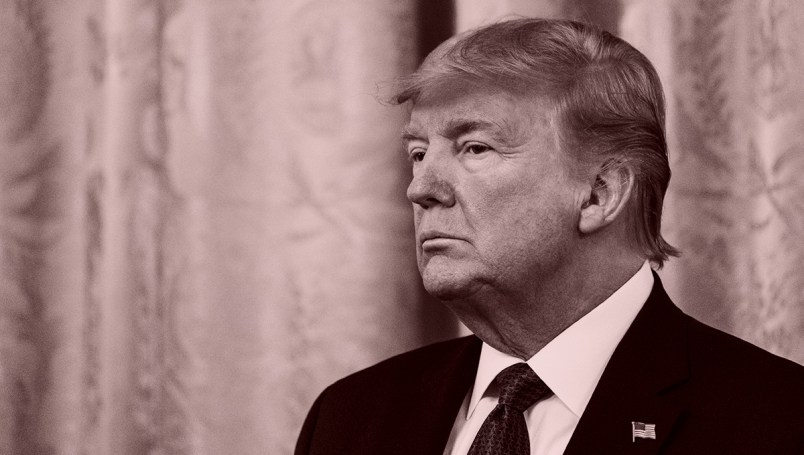This article is part of TPM Cafe, TPM’s home for opinion and news analysis. The following is an excerpt from Sinking in the Swamp: How Trump’s Minions and Misfits Poisoned Washington. (Penguin Random House, on sale Feb. 11, 2020).
Throughout Donald Trump’s long‑running history of legal threats and maneuvers, there has been rampant bluffing, oftentimes taking the shape of verbally violent bluster. In his earlier real estate days, he was known to privately threaten businessmen, lawyers, and other adversaries with “my friends in Jersey” if he felt someone had crossed him. It is unclear if his threats of Mafia violence were backed up by anything remotely actionable or within his power to authorize, or if he was just making a big‑boy noise. Most people who heard this simply rolled their eyes and went about their day.
President Trump was never able to shed his affinity for mob‑don lingo, or at least his pop culture approximation of it. He’d repeatedly blast his former fixer and attorney, Michael Cohen, for being a snitch and a rat for cooperating with the feds and making him look bad, for instance. And Trump sues, or more often emptily threatens to sue or inflict pain via the justice system, as if failing to do so will cause him erectile dysfunction.
But long before he tore from Hillary Rodham Clinton the title of “leader of the free world,” and a decade before he shot to right‑wing political stardom as a garrulous vessel for racist birtherism, Donald John Trump was himself the target of some pettier, less high‑profile legal action. This was due to the fact that during the late 1980s and early 1990s Trump was — allegedly! — busy ripping off some poor schmuck’s board‑game idea.
In 1990, around the time the tabloid press was having a field day with Trump’s brutal split from his first wife, Ivana, a real estate and insurance agent in Michigan named Walter Brockington III (then in his late twenties) briefly became a blip in The Donald’s long life. In a lawsuit that year, Brockington alleged that Trump had stolen his idea for a Monopoly‑esque board game that the real estate mogul created with Milton Bradley and simply called Trump: The Game. For his alleged trouble and dispossession, Brockington sought $50,000 in damages.
It was one of a litany of lawsuits and legal actions, frivolous or otherwise, that have consumed seemingly the entirety of Trump’s seven decades on the planet, including his characteristically litigious presidency.
According to the suit filed in U.S. District Court in Detroit, Brockington claimed he had written Trump a letter in 1988 requesting financial support to move his game, Mogul, from drawing board to reality. Brockington claims that he received a letter back from the Trump Organization stating it was not interested. But the following year, Trump unveiled a new product with Milton Bradley, with Trump: The Game being sold for twenty‑five bucks a pop.
Brockington’s lawsuit ended up going nowhere, and Trump’s board game proved to be a poorly selling dud. But to this day, Brockington believes the similarities between Trump: The Game and his letter to Trump — “the instructions, and the mechanics of Trump’s game,” he said — defied coincidence, thus proving he must’ve been “ripped off” by a supposed titan of industry he once so admired.
“He is a character,” Brockington said during the 2016 GOP presidential primary. “I don’t think he has what it takes to be president. When you look at what he said about immigrants, when you look at what he said about President Obama, he’s a bad example.
“I don’t think he’s gonna make it as president, or the nominee for the Republican Party,” Brockington added, chillingly but without much prescience.
Asawin Suebsaeng and Lachlan Markay are reporters for the Daily Beast.
From SINKING IN THE SWAMP by Lachlan Markay and Asawin Suebsaeng, to be published on February 11, 2020 by Viking, an imprint of Penguin Publishing Group, a division of Penguin Random House, LLC. Copyright (C) 2020 by Lachlan Markay and Asawin Suebsaeng, reporters for the Daily Beast.







At the risk of overusing…
Winston Churchill once said of John Foster Dulles "He’s the only bull I know who carries his own china closet with him."
Back many years ago in junior high a friend and I became obsessed with playing chess. We played as often as we could and somewhere along the line came up with an idea for a chess like battle field board game based on the concept of chess. We submitted it to Milton Bradley as well and got the rejection slip back similar to this story. A few months later MB released the Stratego board game. Maybe based on our idea, maybe not but I’ve always been suspicious.
The only reason this guy owns the GOP is that they are craven and gullible and have caved to 45.
They don’t care, they got their tax cuts.
Whatever happened to standing up to a bully?
Donny Don still at it, threatening ‘heads on pikes’
The only remedy seems to be VOTE BLUE NO MATTER WHO. That is what the craven GOPpers did and now are trying to float the ‘help us help us we think he’s horrible’ defense…of course, all in private so Donnie doesn’t hear…